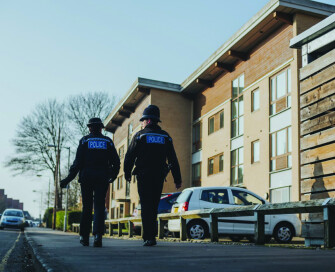PCC's pledge to Panel to focus on visible policing
Visible and trusted policing was the focus of Police and Crime Commissioner, Giles Orpen-Smellie’s second Norfolk Police and Crime Panel. The meeting took place at County Hall on Thursday (27 April) where panellists comprising councillors and independent members scrutinised the actions and decisions of the PCC.
One of the key topics for discussion was:
Pillar Two – Visible and Trusted Policing
Giles explained to the Panel the reason why he would be focussing the rest of his current term in office on visible and trusted policing, Pillar Two of his Police, Crime and Community Safety Plan.
Feedback from engagement events and the precept consultation had made it clear that there was a noticeable ‘expectation gap’ between the public’s expectation of visible policing and the police’s obligation to tackle crime, much of which goes on out of public view.
Giles said: There will always be plenty of voices in such debates, and human nature means that some voices will be louder than others. However, the most important voice, the voice that is often the most difficult to hear, is that of the silent majority.
“My view is that the voice of the silent majority is clear that what people want more than anything else is greater visibility of policing: if the police wish to restore the public’s faith in policing, the police must be visible and accessible within the communities they serve.
“There’s also an issue of increasing public demand while police resources are squeezed, which results in finite numbers of officers being stretched thin as they respond to one call after another with an inevitable impact on routine visible patrolling.
“There’s also, of course, been a degree of unintended separation of the police from the communities they serve due to the closure of police stations and the loss of pcsos, which are consequences of austerity that must now be managed.”
Breckland District Councillor, Gordon Bambridge, told Giles that he had received a lot of enquiries concerning the lack of officers attending parish council meetings.
Giles explained that, due to constraints on resources, officers had been advised not to attend these but to encourage residents to attend the Constabulary’s Safer Neighbourhood Action Panel (SNAP) meetings instead. Beat Officers and Area Inspectors would both be present to answer queries and concerns which was a more effective use of officers’ time.
You can read more about this in Giles’ third blog on visible policing.
Pillar Three – Strategic Priority of ‘Tackling Crime’
Co-opted Independent Member, Peter Hill asked Giles about Objective 5 of Pillar Three, ‘improving victims’ experience of the criminal justice system and raise confidence to reduce crime’ in relation to the current workload for the Victim and Witness Care Team.
Giles responded by saying that each case officer was dealing with 170 cases, which is a huge number of files. “A lot of this arises from court delays. Now we keep talking about Covid but a lot of work has been done post-Covid to reduce court delays and, for example, the Magistrates Court delays were pretty much addressed post-Covid but they are growing again.”
Giles added: “There are a whole raft of reasons of why that is so, looking at it, not as just as a PCC, but in my capacity as Chair of the Local Criminal Justice Board, but at the end of the day, the Victim and Witness Care Team run by the Constabulary is the interface, as I described in my introduction, with all these victims and witnesses. So, they are the people who quite often at sort of 3:30/4:00pm on a Friday afternoon when HMCTS or the CPS knock off and say, ‘oh, by the way, a few changes for you’, they are the people who instead of knocking off at five o’clock are working late on a Friday evening tracking down victims and witnesses who of course might be at work or going about their daily lives and might not be answering their phones, track them down and give them the unhappy news that on Monday their case won’t be in court.
“So, there are a whole load of reasons why the case files sitting on individual desks is growing. Now the precept decision last year, we put eleven additional staff into that team, largely temporary staff, paid for by the precept. That was the scale of the problem we faced then, the problem is not going away.”
Further discussion about delays for victims and witnesses and information about the remaining Pillars: Preventing Offending, Support for Victims and Community Safety can be viewed on Norfolk County Council’s YouTube channel here
Giles’ third blog on visible policing can be read here
The next Norfolk Police and Crime Panel will take place on Monday, 17 July at 11am in the Council Chamber, County Hall, Martineau Lane, Norwich.

Published